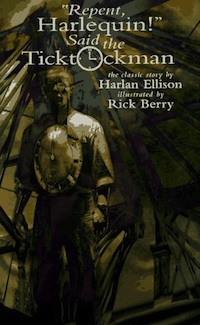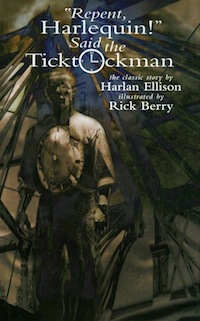Over in the world of English rock n’ roll, Liam Gallagher, one-half of the brotherly duo that once comprised the band Oasis, has released a new album under a new band name; Beady Eye. Not surprisingly, this band sounds almost exactly like Oasis, minus some of the catchier lyrics that once (depending on who you ask) made Oasis great. But no matter what, these guys will always been know for their really big songs. And despite not being fans, nearly everyone I know can sing the words to “Wonderwall,” “Don’t Look Back in Anger,” and “Champagne Supernova.” This is true power.
I am an unabashed Oasis fan, and even am enjoying the new Liam/Beady Eye album. But the thing about those old songs is that they always remind me of one of my favorite writers. And that writer is Harlan Ellison. And just like a cocksure Britpop band that released songs everyone now knows, Ellison will always matter.
If Ellison were one of the Gallagher boys from Oasis, he’d definitely not be Liam, but rather the older, better spoken, (yet pithy) Noel Gallagher. After all, Noel was the primary songwriter and the true genius of the group. But unlike both Gallagher brothers, Harlan Ellison’s ability to put out quality work doesn’t seem to have wavered that much. I’m talking about his recent Nebula nomination for the story “How Interesting: A Tiny Man.”
The story, while incredibly brief, is all anyone could want from magical realism-style literary fiction. It is simple in its premise, the execution is flawless, and it contains a certain amount style that pervades the prose in a way that makes you feel like writing stories must be the easiest thing in the world. The premise of the story is this: the main character creates a tiny man in a laboratory. This initially doesn’t stir up too much trouble, at worst there’s a little scientific curoristy. However, as the story progresses, things get out of hand and suddenly both the creator and the tiny man find themselves persecuted from all sides and at a terrible crossroads.
I can’t stress enough how deceptively simple this story is. Instead of the paragraph above, I could have probably just described its premise by repeating the title “How Interesting: A Tiny Man.” That’s how good Ellison is. The title sums up everything you need to know about the story and as such acts as a synecdoche for the story.
 This is just like his uber-classics “Repent Harlequin!”, Said the TickTockMan, and I Have No Mouth and I Must Scream. These are Ellison’s big ones, his “Wonderwall” and “Champagne Supernova.” I’m not saying “How Interesting: A Tiny Man” is as good or as huge as the stories I just mentioned, but ultimately it doesn’t matter because it’s got his style running through the whole thing. Something Ellison does well that few writers can achieve is a solid mix of tone. Many of his stories like “Djinn, No Chaser” start with an almost comedic tone that gives way to out and out horror. Others, like “Mephisto in Onyx” seem to be a conventional thriller, but then contain elements of a love story, and eventually, a huge epic good versus evil battle.
This is just like his uber-classics “Repent Harlequin!”, Said the TickTockMan, and I Have No Mouth and I Must Scream. These are Ellison’s big ones, his “Wonderwall” and “Champagne Supernova.” I’m not saying “How Interesting: A Tiny Man” is as good or as huge as the stories I just mentioned, but ultimately it doesn’t matter because it’s got his style running through the whole thing. Something Ellison does well that few writers can achieve is a solid mix of tone. Many of his stories like “Djinn, No Chaser” start with an almost comedic tone that gives way to out and out horror. Others, like “Mephisto in Onyx” seem to be a conventional thriller, but then contain elements of a love story, and eventually, a huge epic good versus evil battle.
“How Interesting: A Tiny Man” blends tone in a different way. There’s a strange quietness to the story that initially gives the reader the impression they are dealing with some kind of Geppetto-like narrator; a person who has created something they are unsure of and perhaps frightened of, too. And while this narrator doesn’t seem to change, the world in which he and the Tiny Man inhabit grows so dark and frighteningly recognizable. There’s something very matter of fact about the way Ellison describes the plot, and yet simultaneously haunting, like what you’re reading is a fable or parable.
I first read this story in fall of 2009 while standing up in the Union Square Barnes & Noble with the issue of Realms of Fantasy pressed against my nose. “Come over here!” I said my friend, while I motioned wildly with my hand, “Harlan Ellison has a new story out!” My friend briskly walked over and she too put her nose in the issue and we read the story together there, side by side.
Then I promptly bought the issue and proceeded to go on a kick of rereading all my favorite Harlan Ellison stories. It wasn’t that I’d forgotten how much I liked “Pretty Maggie Moneyeyes” or “Deeper than Darkness,” it was that it was so good to be reading them again. Like Noel Gallagher says on the song “Hello.” It’s good to be back.
Here’s hoping Harlan gives us several more like these.
Ryan Britt’s writing has appeared here, in Clarkesworld Magazine, Nerve.com, and elsewhere. He met Harlan Ellison once years ago and hopes to again soon. He also saw Oasis live at Madison Square Garden just months before they split up for real.










